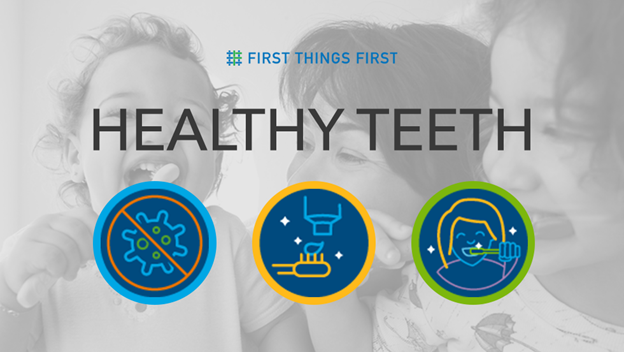
Good oral health in young children plays a critical role in a child’s overall wellbeing and education. Yet, tooth decay is the most common chronic disease faced by young children and is also 100% preventable.
First Things First, Arizona’s early childhood agency and partners, recently launched Healthy Teeth resources (FirstThingsFirst.org/resources/healthy-teeth/) in time for February’s National Children’s Dental Health Month to help more families understand the importance of early oral health and what they can do to help prevent tooth decay in their babies, toddlers and preschoolers.
According to a 2016 First Things First study, conducted in partnership with the Arizona Department of Health Services, 52% of Arizona’s kindergartners have experienced tooth decay compared with 36% of 5-year-old children nationally.
Left untreated, tooth decay in young children’s primary teeth puts them at risk for future problems like damaged permanent teeth; increased vulnerability to infections in other parts of the body, such as the ears, sinuses and the brain; impaired speech development, and reduced self-esteem.
“We know that if a child is seen for their first dental visit by age one, they are 20 times less likely to have cavities at five years old than a child who has their first dental visit at age five,” said Greeta Mills, First Smiles Oral Health Professional with University of Arizona Cooperative Extension. “Early preventive dental visits reduce suffering and save dollars. Our screenings look for any sign of early dental disease. We then visit with the family about our findings and help direct them to their dental home.”
The Healthy Teeth resources offer basic, but often unknown, tips to prevent tooth decay, including in babies. For example, families often don’t know that a child’s first dental visit should happen once the first tooth appears or by their first birthday. Or, that germs that can cause decay can be passed from parents to babies when they lick their pacifier.
Here are four easy tips:
1. Don’t share germs. Your baby is born with no germs in their mouth, but germs are easily passed from yours to theirs — when you share spoons, food or lick their pacifier. Do your best to not put things from your mouth into your baby’s mouth.
2. Limit sugar. Sugar is in many foods, especially sweets (candy, cookies, flavored yogurt and pudding), snacks (chips and french fries) and sweet drinks (soda, juice, teas and sports drinks). Try to serve healthier foods and snacks and give your child more water to drink.
3. Take care of their teeth at home. Starting at birth, clean your baby’s gums with a clean, soft washcloth after each feeding. Once their first teeth appear (usually at about 6 months), gently brush with a soft infant toothbrush and small amount of fluoride toothpaste, about the size of a grain of rice. From ages 1 to 3, try to brush twice a day for two minutes using a smear of fluoride toothpaste. The best times to brush are after breakfast and before bed. Starting at age 3, brush with a pea-sized amount of toothpaste.
4. Take care your child to regular dental check-ups. Schedule your child’s first dental visit when you see their first tooth or by their first birthday. Just like they need regular check-ups with their doctor, your child needs a dental check-up starting at age 1 and every year after that to prevent tooth decay and the need for much more costly dental care later.
About First Things First
As Arizona’s early childhood agency, First Things First funds early learning, family support and children’s preventive health services to help kids be successful once they enter kindergarten. Decisions about how those funds are spent are made by local councils staffed by community volunteers. To learn more, visit FirstThingsFirst.org.
PHOTO CAPTION:
Visit First Things First Healthy Teeth resource at https://www.FirstThingsFirst.org/resources/healthy-teeth/ for tips on how to take care of your young child’s teeth and why it’s important for their healthy development.
